Uncover the Literary Wonders of London and delve into the history and inspiration that shaped the city’s Stories.
London, a city steeped in history, is not just a bustling metropolis; it’s a living, breathing library of literary wonders. In this blog, we embark on a journey through the cobblestone streets and iconic landmarks that have woven themselves into the fabric of literature. From the nostalgic echoes of Charles Dickens to the revolutionary thoughts of Virginia Woolf, Literary London is a celebration of stories etched into the very heart of the city. Join us as we explore not just the physical landscape, but the spirit of a city that has birthed and nurtured countless literary masterpieces. Never been to London? Read my blog on London: A Guide to the City’s Best-Kept Secrets
Brief Overview of Literary London
Before we delve into the winding alleys and grand squares, let’s paint a picture of Literary London. It’s a city that has been a muse to writers for centuries, a place where each street corner tells a story, and each building whispers a tale. From the quaint bookshops tucked away in hidden corners to the grand libraries that guard the collective literary wisdom, Literary London is a mosaic of creativity and inspiration.
Importance of Exploring the Literary History
Why does the literary history of London deserve our exploration? It’s more than just an academic pursuit; it’s a journey into the soul of a city. The literature born here isn’t just ink on paper; it’s a reflection of the society, the culture, and the ever-evolving human experience. By tracing the footsteps of literary giants, we connect with the essence of their words and gain a deeper understanding of the city that shaped their narratives. This is most certainly, Adventure Travel!
In exploring Literary London, we unearth the layers of history that have shaped not only the stories but also the very streets we walk on. It’s a way of time-traveling, of stepping into the shoes of characters long penned and feeling the heartbeat of a city that breathes literature. Join us as we embark on this literary pilgrimage, where each chapter is a new discovery, and each page turned is a step closer to understanding the significance of London in the world of words.
Historical Overview

Evolution of London as a literary hub
London’s metamorphosis into a literary hub is a captivating journey that mirrors the city’s own evolution. From the medieval scrolls to the digital age, the capital has been a fertile ground for literary expression. The story begins with the emergence of the printing press, transforming London into a hub for publishers and setting the stage for a literary renaissance. As the city expanded, so did its literary landscape, welcoming writers from diverse backgrounds and genres. The evolution is not just in the words penned but also in the very soul of the city that embraced and nurtured these creative minds.
Key Periods and Movements in Literary London
Elizabethan Era and Shakespearean Influence:
- The Elizabethan era marked a golden age for literature, and at the forefront was William Shakespeare. The Globe Theatre, with its raucous audiences and timeless plays, became the beating heart of literary London. We explore the echoes of this era through the cobbled streets and the reconstructed Globe, where the spirit of the Bard lingers.
Victorian London and Charles Dickens:
- The 19th century saw London as the epicenter of the Victorian literary world, and Charles Dickens emerged as its literary giant. Dickens not only captured the social issues of the time but also immortalized the city in his novels. As we stroll through the gas-lit streets and visit Dickens’ former residence, we uncover the Dickensian London that persists in both literature and history.
Bloomsbury Group and the Modernist Movement:
- The early 20th century witnessed the rise of the Bloomsbury Group, a collective of intellectuals and artists who challenged traditional norms. With Virginia Woolf as one of its luminaries, Bloomsbury became a haven for avant-garde thought and creativity. We explore the Bloomsbury area, where the echoes of heated literary discussions still reverberate.
Contemporary London:
- As we fast forward to the present, London continues to be a thriving hub for literature. Independent bookshops, literary festivals, and the ever-growing diversity of voices define the modern literary landscape. We dive into the contemporary scene, exploring how the city remains an inspiration for writers of the 21st century.
In this historical overview, we unravel the layers of time that have shaped Literary London, from its humble beginnings to the vibrant literary tapestry it is today.
Famous Authors and their London
Charles Dickens and Victorian London

Visit to Dickens’ Former Residence
Charles Dickens, born on February 7, 1812, in Portsmouth, made London his home for much of his life. To truly immerse ourselves in the Dickensian experience, we wander on a visit to 48 Doughty Street, where Dickens lived from 1837 to 1839. Now the Charles Dickens Museum, this Georgian townhouse provides a glimpse into the author’s personal and creative life. From his writing desk to personal artifacts, every corner echoes the spirit of one of the greatest novelists of the Victorian era.
Exploring Locations from His Novels
Dickens had an unparalleled ability to capture the essence of London in his novels, turning the city into a character itself. As we walk the streets he once trod, we delve into the vivid settings of his timeless works. From the gritty Marshalsea Prison in “Little Dorrit” to the bustling Covent Garden depicted in “Pickwick Papers,” each location tells a story of Victorian London. The date of Dickens’ passing, June 9, 1870, serves as a poignant reminder as we traverse the landscapes that inspired his literary legacy.
Visit to Marshalsea Prison (c. 1849):
- Marshalsea, a debtors’ prison, features prominently in “Little Dorrit.” We explore the remnants of this historical site, reflecting on the harsh conditions that influenced Dickens’ portrayal of social injustice.
Stroll through Covent Garden (c. 1836):
- Covent Garden, a vibrant marketplace, served as a backdrop for scenes in “Pickwick Papers.” We meander through the contemporary Covent Garden, drawing parallels between Dickens’ descriptions and the present-day charm of the area.
Reflection at Westminster Abbey (c. 1859):
- Westminster Abbey, a setting in “Bleak House,” becomes a poignant stop as we reflect on Dickens’ literary contributions. The Abbey’s Poets’ Corner, where Dickens is buried, becomes a place of homage and remembrance.
Through these experiences, we not only pay tribute to Charles Dickens but also witness the enduring impact of his storytelling on the streets and architecture of Victorian London.
Virginia Woolf and Bloomsbury

The Bloomsbury Group and Its Significance
Born on January 25, 1882, Virginia Woolf was a central figure in the Bloomsbury Group—a collective of artists, writers, and intellectuals that included luminaries such as E.M. Forster, John Maynard Keynes, and Woolf’s sister, Vanessa Bell. The Bloomsbury Group, active from the early 20th century, marked a departure from Victorian norms and fostered avant-garde thinking. To understand Woolf’s legacy, we explore the Bloomsbury area, where spirited discussions, artistic collaborations, and a commitment to intellectual freedom defined an era.
Literary Events in the Bloomsbury Area
As we traverse the Bloomsbury streets, we uncover the contemporary literary events that pay homage to Virginia Woolf’s enduring influence.
Bloomsbury Literary Festival (Annual):
- The Bloomsbury Literary Festival, typically held in late spring, celebrates the literary heritage of the area. With talks, discussions, and readings, the festival echoes the intellectual vibrancy of the Bloomsbury Group. Attendees can immerse themselves in Woolf’s world, exploring her works and the influences that shaped them.
Walking Literary Tours (Ongoing):
- Guided literary tours through Bloomsbury offer a deeper understanding of the area’s significance. These tours often include visits to iconic locations associated with the Bloomsbury Group, such as Gordon Square and Tavistock Square. The dates of these tours coincide with key events in Woolf’s life, offering a chronological exploration of her literary journey.
Bloomsbury Group Exhibitions (Rotating):
- Museums and galleries in the Bloomsbury vicinity periodically host exhibitions dedicated to the Bloomsbury Group. These exhibitions, featuring letters, manuscripts, and personal belongings, provide an intimate look into the lives of Woolf and her contemporaries. The dates of these exhibitions vary, offering a dynamic experience for visitors throughout the year.
Through these literary events, we not only honor Virginia Woolf’s legacy but also witness the ongoing celebration of Bloomsbury’s intellectual and artistic contributions.
Shakespearean London

The Globe Theatre and Its Historical Context
Born in April 1564 and departing in April 1616, William Shakespeare, the Bard of Avon, left an indelible mark on London’s theatrical landscape. To comprehend the essence of Shakespearean London, we journey to the Globe Theatre, a reconstruction of the original venue that hosted many of Shakespeare’s plays. Situated along the banks of the Thames, the Globe stands as a testament to the Elizabethan era’s vibrant theatrical scene. We explore the historical context, imagining the hustle and bustle of a 16th-century audience, the timeless allure of the plays, and the cultural impact that echoes through the centuries.
Modern Adaptations and Performances
The spirit of Shakespeare lives on not only in historical reconstructions but also in contemporary adaptations and performances.
Globe-to-Globe Festival (Periodic):
- The Globe-to-Globe Festival, held periodically, brings together theatre companies from around the world to perform Shakespeare’s plays in their native languages. This multicultural celebration pays homage to the global impact of Shakespearean works, fostering a cross-cultural exchange that transcends linguistic boundaries.
Contemporary Productions at the Globe (Seasonal):
- The Globe Theatre continues to host seasonal productions, presenting Shakespeare’s works in an authentic Elizabethan setting. These performances capture the essence of the Bard’s plays while incorporating modern interpretations, making them accessible and engaging for diverse audiences.
Shakespeare’s Globe Exhibition (Year-round):
- The Globe’s exhibition offers an immersive journey into Shakespeare’s life and works. From the construction of the original Globe to the intricacies of Elizabethan theatre, visitors can explore the history and legacy of the playwright. The exhibition provides context to the performances and a deeper appreciation of the cultural impact of Shakespeare’s 39 extant plays.
As we engage with Shakespearean London, we step into a world where the timeless verses of the Bard continue to resonate.
Contemporary Authors
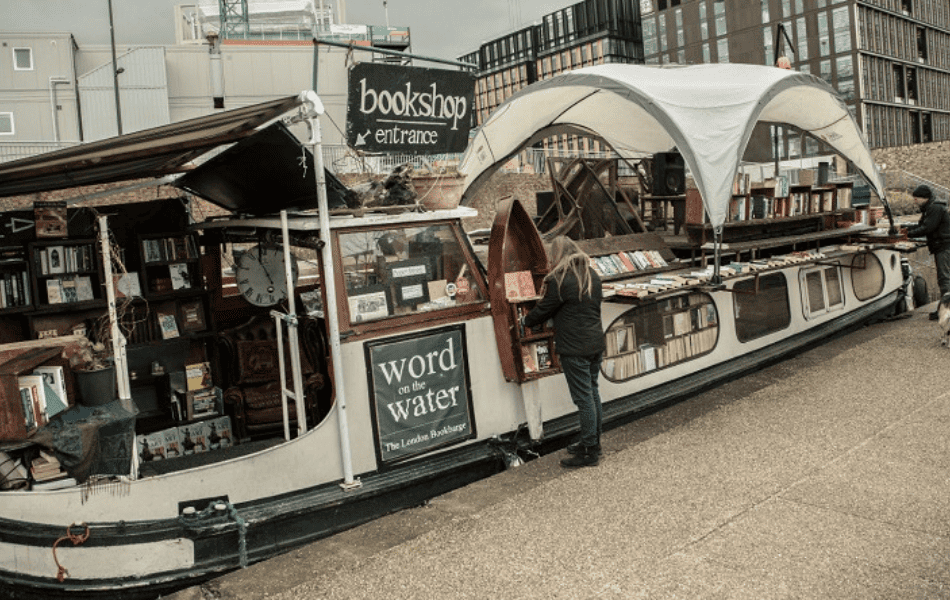
Visiting Bookshops Frequented by Current Authors
London’s bookshops are not just repositories of stories but also sanctuaries for contemporary authors seeking inspiration and connection with their readers. We go on a journey through the city’s vibrant bookish nooks, exploring those frequented by today’s literary voices.
Daunt Books in Marylebone:
- A haven for travel writers and literature enthusiasts, Daunt Books in Marylebone offers a curated collection that attracts contemporary authors seeking unique narratives. We explore the wooden galleries and Edwardian oak galleries, where the shelves whisper tales of modern wordsmiths.
Word on the Water:
- Moored on Regent’s Canal, Word on the Water is a floating bookshop that draws in both authors and book lovers. We navigate the narrowboat shelves, discovering the eclectic selection favored by writers who find solace in this unconventional and inspiring space.
Persephone Books in Bloomsbury:
- Specializing in neglected classics and 20th-century female authors, Persephone Books in Bloomsbury is a treasure trove for contemporary writers seeking hidden gems. We wander through the pastel-hued shelves, uncovering the literary treasures that resonate with today’s wordsmiths.
Attending Literary Events Featuring Contemporary Writers
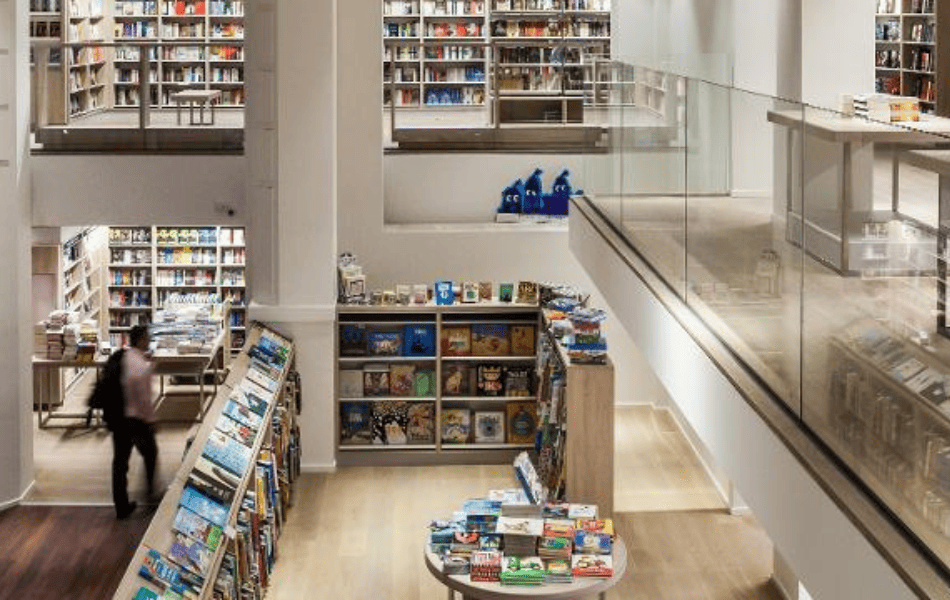
London’s literary calendar is rich with events that bring contemporary authors into the spotlight. We submerge ourselves in the dynamic world of literary gatherings, where writers engage with readers, share insights, and celebrate the diversity of modern storytelling.
London Literature Festival (Annual):
- Held at the Southbank Centre, the London Literature Festival is a vibrant celebration of contemporary literature. Attendees can engage in panel discussions, author interviews, and book signings, providing a unique opportunity to connect with Word on the Water writers shaping the literary landscape.
Author Talks at Foyles Bookshop:
- Foyles, a renowned London bookstore, hosts regular author talks and book launches. We attend one of these events, witnessing the exchange between writers and their audience, and gaining firsthand insights into the creative process and the stories that fuel their narratives.
Literary Salons and Open Mic Nights (Various Venues):
- London’s literary scene is dotted with intimate salons and open mic nights. We participate in one of these gatherings, where emerging and established authors come together to share their work and foster a sense of community among the city’s literary enthusiasts.
Navigate the contemporary currents of London’s literary scene, exploring the bookish havens and events that serve as the pulse of modern storytelling in this vibrant metropolis.
Literary Events Calendar
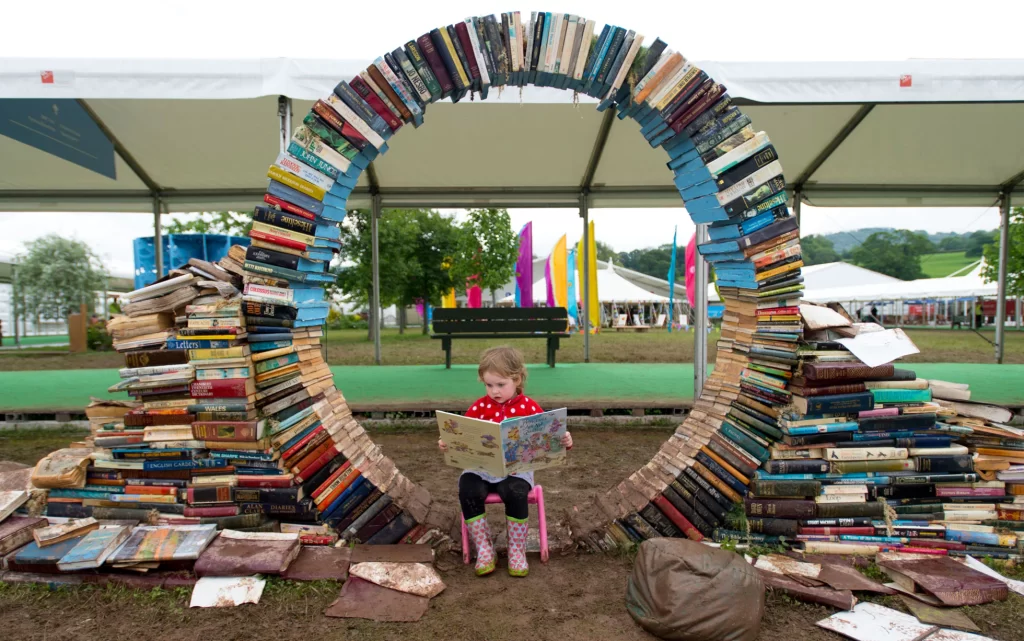
Overview of Dates and Featured Authors
London’s literary festivals are the beating heart of the city’s literary calendar, drawing in authors and book lovers from around the globe. We provide a curated overview of some of the major literary festivals, their dates, and the celebrated authors set to grace their stages.
London Book Fair (Annual – Spring):
- A global marketplace for rights negotiation and a platform for authors, the London Book Fair is a must-attend event in the literary world. We explore the diverse range of topics covered in seminars and the array of international authors presenting their work.
Hay Festival, London (Annual – May/June):
- An extension of the renowned Hay Festival in Wales, the London edition brings together literary giants, intellectuals, and cultural enthusiasts. We delve into the program, highlighting key sessions and discussions featuring influential contemporary writers.
Cheltenham Literature Festival (Annual – October):
- While not directly in London, the Cheltenham Literature Festival is a short journey away and is one of the UK’s most celebrated literary events. We provide insights into the festival’s eclectic program, featuring established and emerging authors across genres.
Tips for Attending and Participating
Plan Ahead:
- With a multitude of events, planning is essential. Research schedules, identifying favorite authors, and strategically navigating festival venues to maximize the experience.
Engage in Author Q&A Sessions:
- Attending author Q&A sessions provides a unique opportunity to gain insights into the creative process, ask burning questions, and connect with the minds behind the words.
Book Signings and Meet-and-Greets:
- Many festivals host book signings and meet-and-greets. Know your strategies for securing coveted signatures and interacting with authors in a meaningful way.
Explore Festival Fringe Events:
- Beyond the main stage, festival fringes often showcase emerging talent and experimental literary forms. Explore these hidden gems for a more immersive experience.
Network with Fellow Book Enthusiasts:
- Literary festivals are a hub for like-minded individuals. We offer tips on networking with fellow book enthusiasts, joining discussions, and participating in the communal celebration of literature.
Self-Guided Literary Tours
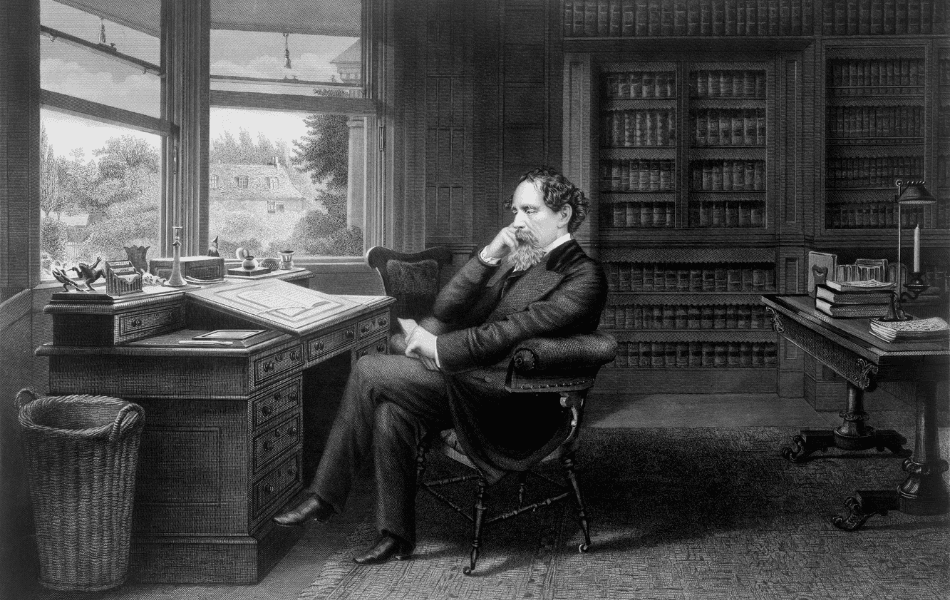
A. Mapping Out a Dickens-Themed Tour
Charles Dickens left an indelible mark on London, and a self-guided tour allows us to trace his footsteps and delve into the settings of his iconic novels.
Starting Point: Charles Dickens Museum (48 Doughty Street):
- Begin the journey at Dickens’ former residence, now the Charles Dickens Museum. Explore the author’s personal artifacts, manuscripts, and the rooms where he penned some of his most famous works.
Marshalsea Prison:
- Travel to Southwark to visit the remnants of Marshalsea Prison, a significant location in “Little Dorrit.” Reflect on the conditions that influenced Dickens’ depiction of social injustice.
Covent Garden:
- Explore the vibrant Covent Garden, featured prominently in “Pickwick Papers.” Wander through the markets and streets that Dickens vividly brought to life in his writing.
Westminster Abbey (Poets’ Corner):
- Conclude the tour at Westminster Abbey, paying homage to Dickens’ final resting place in Poets’ Corner. Reflect on the profound impact he left on both literature and the city.
B. Walking Through Literary Neighborhoods Like Bloomsbury
Bloomsbury, a haven for writers and intellectuals, offers a self-guided journey through the heart of London’s literary scene. Walking is wonderful, but prior to going to London and prior to exploring on foot, make sure you read my article on Hiking Beginner Tips for Seniors: Crucial points to know. Your feet should be prepared!
Gordon Square:
- Begin in Gordon Square, the central gathering place for the Bloomsbury Group. Visit the Virginia Woolf statue and soak in the intellectual atmosphere that once fueled groundbreaking discussions.
Tavistock Square:
- Continue to Tavistock Square, where the Tavistock Hotel stands as a reminder of Virginia Woolf’s time in the area. The square itself is steeped in literary history and serves as a peaceful retreat.
British Museum:
- Conclude the tour at the British Museum, a cultural hub and a source of inspiration for many Bloomsbury writers. Explore the exhibits and gardens that continue to attract creative minds.
C. DIY Shakespearean Tour: Visiting Relevant Landmarks
To immerse ourselves in the world of Shakespeare, embark on a self-guided tour, tracing the footsteps of the Bard through London.
The Globe Theatre (21 New Globe Walk):
- Begin at the reconstructed Globe Theatre, a living testament to Shakespearean theatre. Explore the exhibition and catch a performance if available to experience the magic of the Bard’s works in an authentic setting.
Southwark Cathedral (London Bridge):
- Visit Southwark Cathedral, where Shakespeare’s brother is buried. The cathedral’s connections to the Shakespeare family add depth to the tour.
Westminster Abbey (Poets’ Corner):
- Conclude at Westminster Abbey, where Shakespeare is also honored in Poets’ Corner. Reflect on the enduring legacy of one of the greatest playwrights in the English language.
Hidden Gems and Lesser-Known Authors
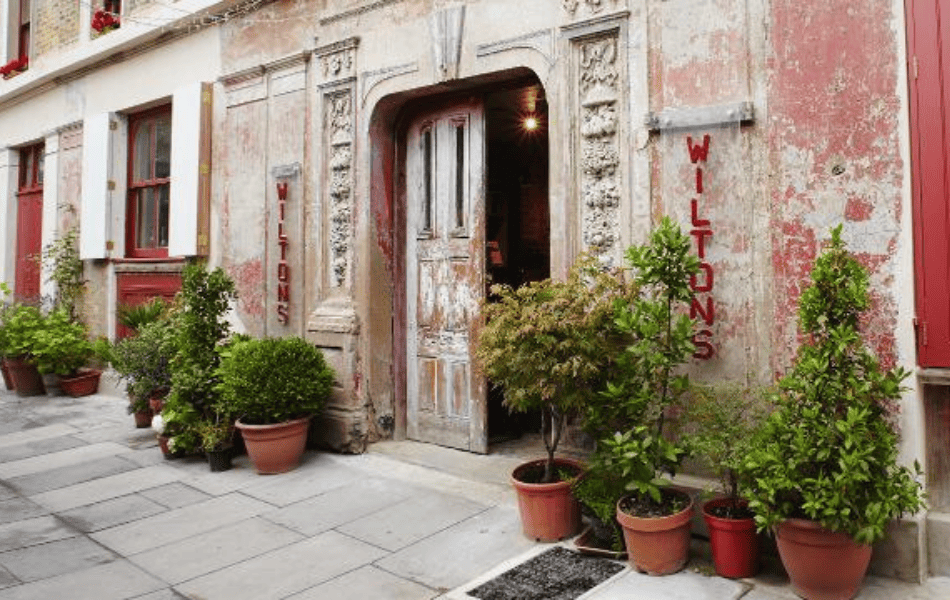
Exploring Lesser-Known Literary Locations
Beyond the well-trodden paths, London harbors hidden gems that whisper stories known to the discerning few. Discover the city’s lesser-known literary haunts.
Wilton’s Music Hall (Graces Alley, E1):
- Dive into the historic ambiance of Wilton’s Music Hall, the world’s oldest surviving music hall. Tucked away in East London, this venue has witnessed performances that resonate with the spirits of forgotten wordsmiths.
The Seven Dials (WC2H):
- Wander through the labyrinthine streets of the Seven Dials, where lesser-known bookshops and literary cafes await discovery. Uncover the hidden corners where the city’s literary subcultures thrive.
Eel Pie Island (Twickenham):
- Take a trip to Eel Pie Island, a private island on the Thames with a rich bohemian history. It once hosted literary gatherings, and concerts, and was a haven for creative minds seeking respite from the city’s hustle.
Introducing Authors with a Strong Connection to London
London has been a muse for countless authors, both celebrated and overlooked. Delve into the stories of writers who found inspiration in the city’s streets and neighborhoods.
Muriel Spark (1918-2006):
- Explore Muriel Spark‘s connection to London, particularly her time in Kensington. The author of “The Prime of Miss Jean Brodie” drew from her experiences in the city’s literary circles.
Patrick Hamilton (1904-1962):
- Uncover the works of Patrick Hamilton, a British playwright and novelist. His novels, set in the gritty backdrop of pre-war London, provide a stark portrayal of the city’s underbelly.
Meera Syal (b. 1961):
- Meet Meera Syal, a British-Indian author and actress. Her novels, including “Anita and Me,” intricately weave London’s multicultural tapestry into the narrative.
Peter Ackroyd (b. 1949):
- Delve into the extensive literary contributions of Peter Ackroyd, known for his historical novels set in London. His works, such as “London: The Biography,” offer a unique perspective on the city’s evolution.
Tips for Literary Exploration
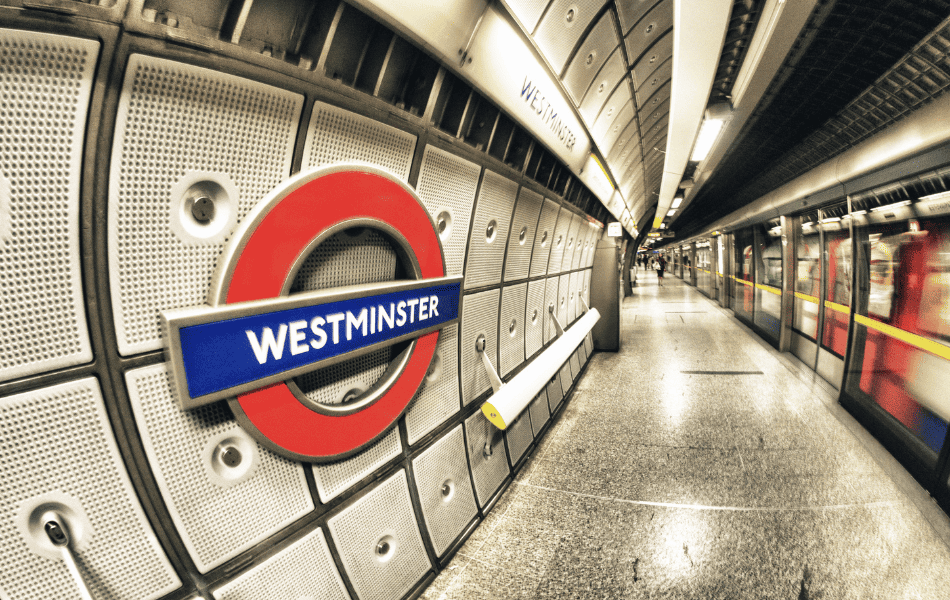
A. Navigating Public Transportation for Literary Adventures
London’s extensive public transportation system is a literary explorer’s best friend.
Utilize the Underground (Tube):
- The Tube is the quickest way to hop between literary hotspots. Plan your journeys using the Tube map, and consider an Oyster card for seamless travel.
Embrace London’s Buses:
- London’s iconic double-decker buses offer a scenic route to literary destinations. Plan your route, sit back, and absorb the city’s literary ambiance from the upper deck.
Stroll Through Literary Districts:
- Some literary neighborhoods are best explored on foot. Plan walking routes through Bloomsbury, Soho, and other bookish boroughs, allowing for serendipitous discoveries.
B. Best Times to Visit Bookshops and Attend Events
Timing is key when immersing yourself in London’s literary scene.
Weekday Mornings for Quiet Exploration:
- If you prefer a serene browsing experience, visit bookshops on weekday mornings. You’ll have the shelves to yourself before the hustle and bustle of the day begins.
Evenings for Literary Events:
- Most literary events take place in the evenings. Check event schedules and plan your visits accordingly, ensuring you don’t miss book launches, author talks, and readings.
Avoid Peak Tourist Times:
- Bookshops and literary landmarks can get crowded during peak tourist hours. Consider early mornings or late afternoons to enjoy a more intimate experience.
Festival Seasons for Literary Extravaganza:
- London’s literary festivals often occur in spring and autumn. Plan your visit during these seasons to partake in the festivities and catch glimpses of your favorite authors.
C. Engaging with the Literary Community in London
London’s literary community is welcoming and diverse.
Join Book Clubs and Reading Groups:
- Participate in book clubs and reading groups that meet in local bookshops or libraries. It’s an excellent way to discuss literature, discover new authors, and connect with like-minded readers.
Attend Open Mic Nights:
- Many pubs and cafes host open mic nights for writers. Attend these events to witness emerging talents, share your work, or simply enjoy the spoken word in a relaxed setting.
Follow Literary Blogs and Social Media:
- Stay informed about literary events, book releases, and author signings by following literary blogs and social media accounts. London’s vibrant literary scene is often buzzing with updates.
Visit Writers’ Workshops and Writing Retreats:
- Engage with the writing community by attending workshops and retreats. London offers various opportunities for writers to hone their craft, network, and find inspiration.
Navigating London’s literary wonders is an art, and with these tips, you’ll be well-equipped to unravel the city’s literary treasures while immersing yourself in its rich culture.
Conclusion
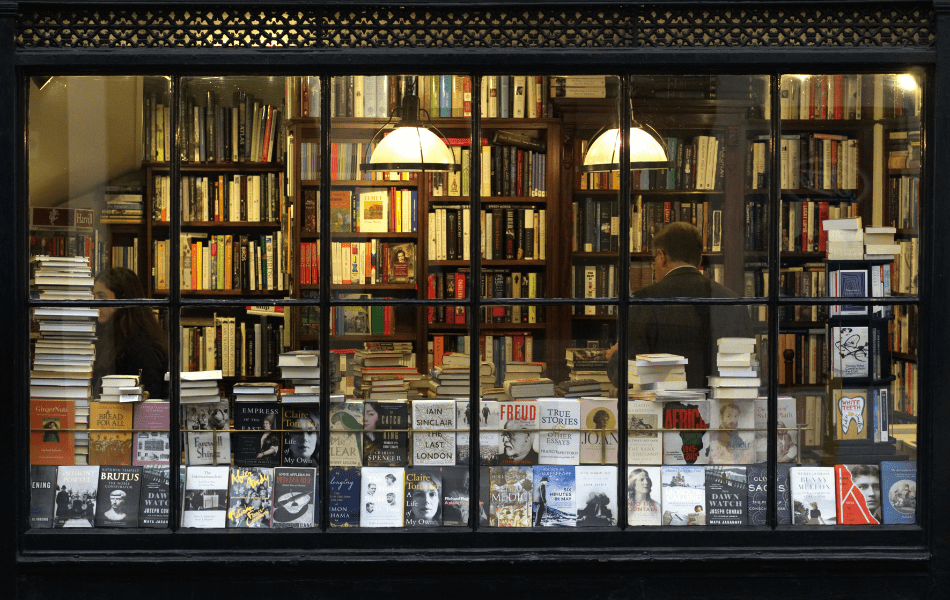
In this exploration, we’ve traced the footsteps of Dickens, wandered through Bloomsbury’s intellectual havens, and relished Shakespearean echoes. London’s streets are a living library, each cobblestone steeped in the ink of literary giants, shaping a narrative that transcends time.
London’s literary pathways await discovery. Immerse yourself in the narratives echoing through its streets, engage with the vibrant community, and let the city’s literary magic weave its spell. Uncover the stories, savor the words, and embark on your own literary odyssey through the heart of London. Happy exploring!
Frequently Asked Questions

What are the best literary festivals in London to visit?
Some of the best literary festivals in London to visit include the London Book Fair, Hay Festival London, and the Cheltenham Literature Festival (which is in close proximity to London).
Where is the London Book Fair Held?
The London Book Fair is held at Olympia London, a renowned exhibition center in West Kensington, London.
What is the London Literature Festival and where is it held?
The London Literature Festival is the 16th edition of an annual celebration of literature, which is the longest-running literature festival in London, featuring author talks, discussions, and performances, and it is typically held at the Southbank Centre on the South Bank of the River Thames.
What is the oldest bookshop in London?
The oldest bookshop in London is Hatchards, established in 1797, and it continues to operate as a historic and esteemed bookstore on Piccadilly.
Where do most writers love to go to in London?
Many writers love to visit the British Library in London, a revered haven for research, peace quiet, and inspiration, where an extensive collection of literary treasures awaits exploration.
Which bookshop in London is the largest?
Waterstones Piccadilly in London is the largest bookshop in Europe, spanning over eight floors and offering a vast selection of books across genres.
Where in London is Black Books and why is it so popular?
Black Books is a fictional bookstore located in the Bloomsbury area of London, gaining popularity through its portrayal in the British sitcom “Black Books,” where its eccentric owner, Bernard Black, navigates the hilarious and chaotic world of bookselling, adding a unique charm to this imaginary literary establishment. While not a real bookstore, its cult following stems from the witty humor and memorable characters depicted in the television series.
Which street in London has the most bookshops?
Charing Cross Road in London’s West End is renowned for having the highest concentration of bookshops, with a diverse array of independent and chain stores lining the street, making it a mecca for book lovers seeking a rich literary experience in the heart of the city. Cecil Court is a pedestrian street with Victorian shop frontages in Westminster, England, linking Charing Cross Road and St Martin’s Lane. Since the 1930s, it has been known as the new Booksellers’ Row.
Is there a Harry Potter tour in London?
Yes, there are several Harry Potter tours in London that take fans to iconic locations featured in the books and films, including Platform 9¾ at King’s Cross Station, the Leadenhall Market (Diagon Alley), and the Warner Bros. Studio Tour for a behind-the-scenes experience.
One thought on “Literary London: Navigating Pages of a City’s Rich History”
Comments are closed.
Recent Posts
Discover Peartree Serviced Apartments Salisbury, once the Clovelly Hotel, a pet-friendly, stylish stay near the cathedral, station and Wiltshire’s top sights. Some places simply give you a bed...
Discover insider tips to find cheap flights from the UK, save on easyJet, Ryanair & BA, and score the best weekend and last-minute deals. Why You’re Paying Too Much for Flights Most UK...


A mouth-watering prospect – to spend months in the UK exploring libraries, bookshops, famous authors and related sites. Great info!